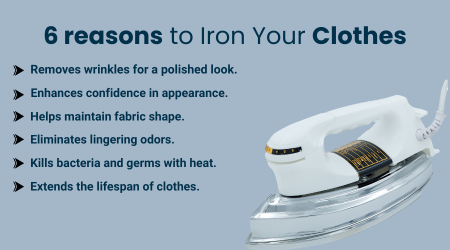
In this modern high-paced world, image-conscious society, your appearance and clothing can eloquently speak volumes more than the words themselves. It is a social image, a silent message of discipline, self-respect and organization. One way or another the decision to iron the clothes establishes a powerful message about the day whether you are going to a big meeting, celebration or personal event. A well-pressed outfit is priceless-vanity pales in comparison, it enhances your first impression, cushions the cost of clothing and gives confidence to the wearer.
The impression of ironed clothes starts with confidence.
Just walking in a room with ironed clothes will immediately indicate care and discipline. An iron dress worn to a job interview or business meeting is soon a part of the professional first impression. It is a subconscious belief of people that pressed clothes are associated with responsibility and systematic thinking-qualities everyone would enjoy. Ironed or unaproned clothes are used socially to show personal style, detailing and showing respect to self and others. The decision to iron the clothes is a visible sacrifice towards quality--to assist people to stand out in busy, competitive places.
A psychological association between clothing and mood is not a new phenomenon, and it is known as enclothed cognition. The researchers at Northwestern University discovered that individuals were more focused and self-assured when they are in clothes that are linked to care and command. Even wearing an ironed dress or shirt can make the person feel better, less anxious, and motivated to feel self-respect.
The hygiene benefits of ironing the clothes include the fact that the heat produced by a clothes iron can kill any bacteria that remain on the clothes as well as odors which occasionally resist the washing process. Fabric integrity: Ironing regularly helps to avoid wrinkles in the fabric before they settle, thereby reducing friction and unwanted wear.
Ironed clothes will preserve their structure and color more over time, which will make each garment last longer and appear newer. The regular routine in trying to iron dress shirts or other casual clothes promotes not only cleanliness but also durability, providing each piece of clothing with a second life on the shelf.
Read More: Types of Wallex Iron for Clothes
The conventional clothes iron has always been the choice of every household in the world, and it can cope with heavy clothes as well as fragile silks. Steam irons are much easier to use with embedded vapor power, and garment steamers are an alternative source of quick wrinkle removal that causes no heat damage. Iron-on clothes-solutions, like wrinkle release sprays or ironing patches, are a quick fix until you get home and can iron clothes properly, but nothing can compare to the clean look of an ironed piece of clothing. The decision will be based on the type of garment, urgency, and required degree of polish.

Each of the fabrics needs a special method, when ironing the clothes:
Dress Shirts (Cotton/Linen): It is best to iron it when it is a little wet. Heat on medium high and begin with collars and cuffs to give form.
Casual Wear (Blends/Synthetics): Lower temperatures and rapid and fluid movements will prevent shine or burning.
Delicate (Silk/Wool): The lowest setting of the iron should be used always; a cloth must not be placed between iron and the fabric. Never use a lot of steam with silk, a lot of steam with wool, but not much pressure.
Ironing Dress Clothes: Take time to iron pleats and hems--particularly on dresses. Professional results of patience.
Sustainability Angel: Life of Clothes and Waste: Being conscious of our wardrobe is not about being fashionable, but it is about being sustainable. When people decide to iron their dress clothes on a regular basis, they increase the longevity of the garment, thereby eliminating the necessity of having to change their clothes regularly. Luckier buying will reduce the pressure on the environment and the reliance on fast fashion.
During the momentous occasions in life, the ironing of the clothes is not negotiable.
Weddings: The dress has to be perfectly ironed either at the altar or as a guest.
Interviews: Wearing perfectly ironed and smooth clothes puts you right in the business.
Public Speaking: Smoothed clothes are a sign of authority and inspire more confidence.
Family Gatherings: You work hard to iron dress clothes to demonstrate that you care and respect what you share.
A creased suit will unintentionally kill the charm and water down the effect--by making sure to have your iron dress on hand at these events you are sending the right message.
Making the decision to iron on clothes is a voluntary gesture of self-respect and ambition. It is a tradition that goes beyond tradition, gives one a head start to success, creates a positive mindset, and contributes to the environment. It may be tugging at an ironed dress in anticipation of an important event or keeping the house in order, but the results far outweigh the looks. Frequent use of a clothes-iron forms character, builds self-esteem, and opens the door--and one of the most rewarding habits men can maintain is the determination to iron his clothes.
Ans: Ironing clothes removes wrinkles, kills germs, enhances appearance, and helps clothes last longer by preserving their quality and shape.
Ans: No, not all fabrics should be ironed—always check the care label and use the right temperature, as delicate fabrics like silk or polyester require extra caution.
Ans: You can use a traditional dry iron or a steam iron; steam irons are preferred for versatility and efficiency with most fabrics.
Ans: Iron clothes as needed based on personal preference and garment type—some iron after every wash, others only for special occasions or visible wrinkles.